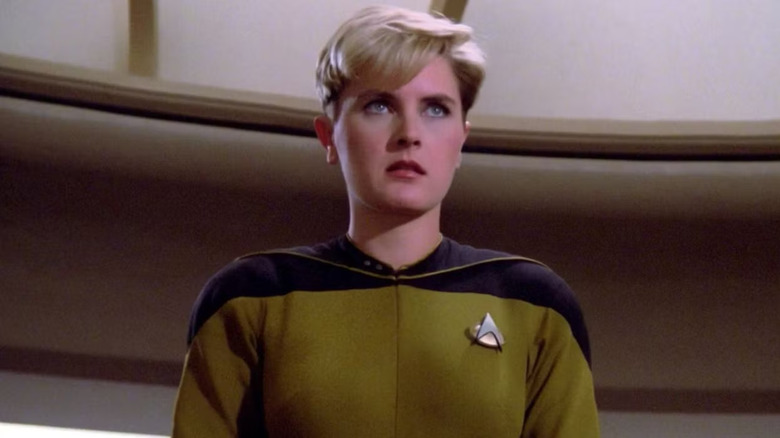The “Star Trek” franchise has at all times been fairly progressive, however for a few years it may be fairly darn tough for the ladies who labored on it. Franchise creator Gene Roddenberry and a few of his disciples, together with “Star Trek: The Subsequent Technology” and “Star Trek: Deep Area 9” producer Rick Berman, appeared to deal with the feminine characters and the ladies that performed them as eye sweet and little extra. Although “Star Trek: The Unique Collection” had solely Roddenberry’s spouse Majel Barrett-Roddenberry as Nurse Chapel and Nichelle Nichols as Lt. Uhura, “Star Trek: The Subsequent Technology” was set to have slightly extra equality, with massive roles for girls in counselor Deanna Troi (Marina Sirtis), Chief Medical Officer Beverly Crusher (Gates McFadden) and Chief Safety Officer Tasha Yar (Denise Crosby). Sadly, by season 2, two of these girls could be gone.
In a panel at Star Trek Las Vegas in 2018 (through ScreenRant), Sirtis revealed that her future on the present was fairly unsure after the primary season, however after Crosby’s Tasha Yar was killed off, she knew she was protected for at the very least a short while.
Denise Crosby’s departure saved Sirtis protected
It is actually unlucky, however “Star Trek” has an extended historical past of girls being written off and fired, beginning with Grace Lee Whitney’s character Janice Rand allegedly being written off just because her character had an excessive amount of chemistry with Captain James T. Kirk (William Shatner), which might have saved him from being an alien-humping bachelor. Sirtis instructed the viewers on the panel that she knew she was “on the bubble” of being fired and that she felt purely “ornamental” when co-star Crosby requested to be written out of the present close to the top of season 1 (on account of frustrations of her personal about being a intercourse object with little to do). When Frakes pushed again and mentioned she in all probability wasn’t about to be fired, Sirtis confirmed it:
“Majel [Roddenberry] instructed me for a reality. Years later, I confronted her, as a result of we have been very shut […] I mentioned to Majel years later, ‘Majel, I used to be going to get fired, wasn’t I?’ And he or she mentioned ‘sure, you have been. Gene got here house someday and mentioned we’ve got one too many ladies.’ […] You want a physician, you want a safety chief, you actually do not want a psychologist. And it was when Denise [Crosby], Denise had no clue, however when Denise left the present, she saved my job.”
Although she did not actually need her character to die, Yar was killed off. Shortly after, McFadden was requested to not return for season 2, although she was changed by one other feminine Chief Medical Officer, Dr. Kate Pulaski (Diana Muldaur). Each McFadden and Crosby would finally return, however it seems like their leaving after they did saved Sirtis from the chopping block.
Troi was spared a darkish destiny
It is actually a disgrace that Roddenberry allegedly wished to do away with Troi just because there have been too many ladies on the crew, particularly when she finally ended up being some of the vital members of the Enterprise crew. Because the ship’s counselor, she helped lots of the characters course of their emotions over the completely bonkers nonsense they needed to face as part of being on the ultimate frontier, giving us perception into their lives that was even higher than private logs. Not solely that, however her relationship with Riker is truthfully the one actually good lasting romance in all of “Subsequent Gen.”
Sadly, one other nice character would face a irritating finish just some years in a while sister sequence “Star Trek: Deep Area 9,” with Terry Farrell’s Lieutenant Commander Jadzia Dax being killed off as a substitute of having her half diminished on the finish of the present’s sixth season, like she had requested for. Not each actor who has left the franchise did so on such a bitter be aware, however it’s wild what number of girls parted methods with “Star Trek” for sexist causes. Issues appear to be principally higher lately, however the twentieth century definitely was a time.




